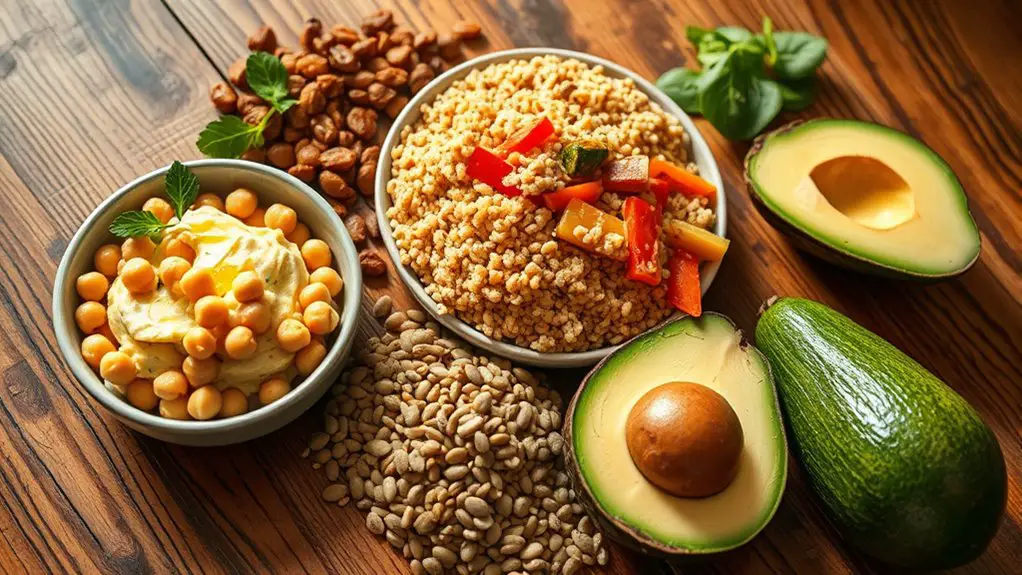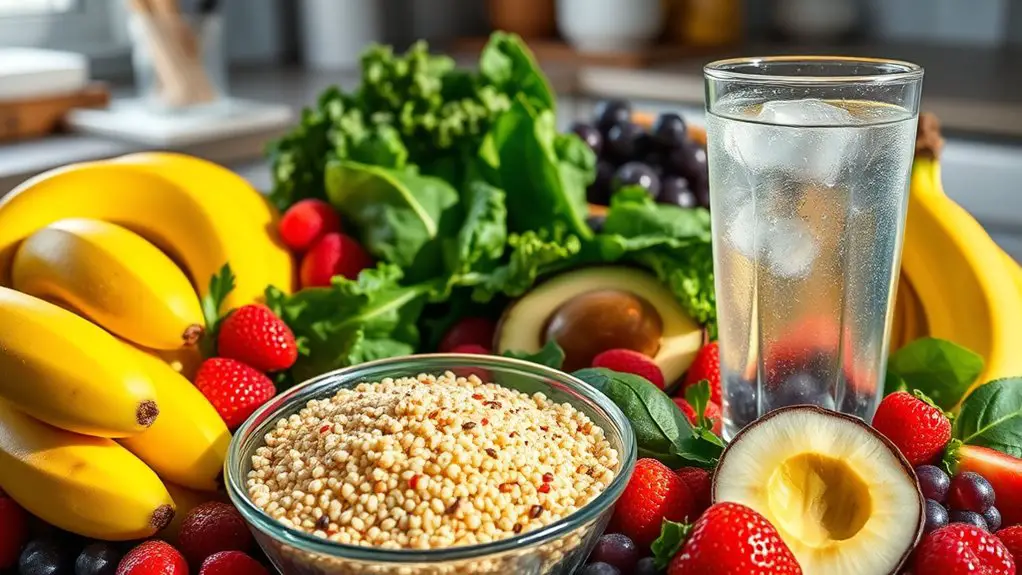To reduce inflammation naturally through diet, focus on incorporating vibrant fruits and veggies, whole grains, nuts, and seeds. Include fatty fish rich in omega-3s, like salmon, or opt for plant-based sources such as flaxseeds and walnuts. Embrace anti-inflammatory spices like turmeric and ginger, while minimizing processed foods that are high in refined sugars and unhealthy fats. A balanced meal plan can make a big difference, and there's more valuable information to enhance your health journey ahead.
Understanding Inflammation: Causes and Effects
Although inflammation is a natural response of your body to injury or infection, understanding its causes and effects can help you manage it better. Inflammation can arise from various sources, like stress, poor diet, or environmental toxins. Recognizing these triggers empowers you to make informed choices that promote your well-being.
The effects of inflammation can be quite disruptive; it can lead to discomfort, fatigue, and even chronic diseases if left unchecked. By tuning into your body and identifying what sparks inflammation, you can take steps to reduce its impact. Remember, knowledge is your ally in reclaiming your health and freedom. Embrace a proactive approach, and you'll pave the way for a more vibrant life, free from the constraints of inflammation.
The Role of Antioxidants in Fighting Inflammation
Antioxidants play an essential role in combating inflammation, as they help neutralize free radicals that can cause cellular damage. By incorporating antioxidants into your lifestyle, you can support your body's natural defenses against inflammation, promoting better overall health.
Here's a quick overview of common antioxidants and their sources:
| Antioxidant | Food Sources |
|---|---|
| Vitamin C | Citrus fruits, bell peppers |
| Vitamin E | Nuts, seeds, spinach |
| Selenium | Brazil nuts, seafood |
| Flavonoids | Berries, tea, dark chocolate |
| Carotenoids | Carrots, sweet potatoes |
Embracing these powerful nutrients can empower you on your journey to reduce inflammation naturally, allowing you to live a more vibrant life.
Anti-Inflammatory Foods to Incorporate Into Your Diet
Incorporating anti-inflammatory foods into your diet can greatly enhance your efforts in reducing inflammation and improving overall health. Start by adding vibrant fruits and veggies like berries, spinach, and kale, which are packed with antioxidants. Whole grains, such as brown rice and quinoa, provide essential nutrients while keeping you full and satisfied. Don't forget about nuts and seeds; almonds and flaxseeds are excellent choices. Spice up your meals with turmeric and ginger—they're natural powerhouses that can help ease inflammation. Finally, consider incorporating healthy oils like olive oil for cooking or as a dressing. By choosing these foods, you'll not only enjoy delicious meals but also take control of your health and well-being. Embrace the freedom of nourishing your body!
The Importance of Omega-3 Fatty Acids
While many foods can help combat inflammation, omega-3 fatty acids stand out for their powerful anti-inflammatory properties. These essential fats aren't just good for your heart; they can also help reduce inflammation throughout your body. By incorporating omega-3s into your diet, you can promote better overall health and wellness.
- Rich sources include fatty fish like salmon and mackerel
- Flaxseeds and chia seeds are great plant-based options
- Walnuts add a tasty crunch and nutritious boost
- Omega-3 supplements can be beneficial if dietary sources are lacking
- They support brain health, mood stability, and joint flexibility
Embracing omega-3 fatty acids can truly empower you to take control of your health and enjoy a life with less inflammation.
Spices and Herbs That Combat Inflammation
When you think about fighting inflammation, spices and herbs might not be the first things that come to mind, yet they can play an essential role in your diet. Incorporating these powerful ingredients can empower you to manage inflammation naturally. Here are a few top contenders:
| Spice/Herb | Benefits |
|---|---|
| Turmeric | Contains curcumin, a potent anti-inflammatory agent. |
| Ginger | Known for reducing muscle pain and soreness. |
| Cinnamon | May lower blood sugar and reduce inflammation. |
Adding these spices to your meals or sipping on herbal teas can not only enhance flavor but also support your journey to living free from chronic inflammation. Don't underestimate the power of nature's pantry!
The Impact of Processed Foods on Inflammation
Processed foods can considerably contribute to inflammation in your body, as they're often high in refined sugars, unhealthy fats, and artificial additives. These ingredients can disrupt your immune system and trigger inflammatory responses. To maintain your freedom and well-being, it's crucial to be mindful of what you consume. Here are some common processed food culprits to watch out for:
- Sugary snacks and beverages
- Fast food items
- Processed meats like sausages and deli meats
- Pre-packaged meals
- Artificially flavored or colored foods
Creating a Balanced Anti-Inflammatory Meal Plan
To effectively combat inflammation, creating a balanced anti-inflammatory meal plan is essential. Start by incorporating plenty of colorful fruits and vegetables, like berries and leafy greens, which are packed with antioxidants. Whole grains, such as quinoa and brown rice, provide fiber and help stabilize blood sugar levels. Don't forget healthy fats from sources like avocados, nuts, and olive oil; they're crucial for reducing inflammation. Lean proteins, including fish and legumes, should also be included. Aim to minimize processed foods and added sugars, as they can worsen inflammation. Plan your meals with variety, allowing your taste buds to explore new flavors while giving your body the nutrients it craves. Embrace this journey toward better health and freedom from inflammation!
Frequently Asked Questions
Can Stress Affect Inflammation Levels in the Body?
Yes, stress can markedly affect inflammation levels in your body. When you're stressed, your body releases hormones that may trigger inflammation, making it vital to manage stress for overall health and well-being.
How Does Sleep Quality Impact Inflammation?
Sleep quality greatly impacts inflammation levels in your body. When you're well-rested, your immune system functions better, reducing inflammatory markers. Poor sleep, on the other hand, can heighten inflammation, affecting your overall health and well-being.
Are There Specific Beverages That Help Reduce Inflammation?
Imagine sipping on liquid sunshine! You'll find that beverages like green tea and tart cherry juice can be your allies against inflammation. They're not just drinks; they're your rejuvenating escape to a healthier, vibrant you.
What Lifestyle Changes Can Further Aid in Reducing Inflammation?
To reduce inflammation, you can incorporate regular exercise, prioritize sleep, manage stress, and avoid smoking. These lifestyle changes, combined with a healthy diet, can greatly improve your overall well-being and promote a more balanced life.
How Long Does It Take to See Results From Dietary Changes?
You might notice changes in a few weeks, but it often takes a couple of months for significant results. Patience's key, as your body adjusts and heals from the inside out. Enjoy the journey!




